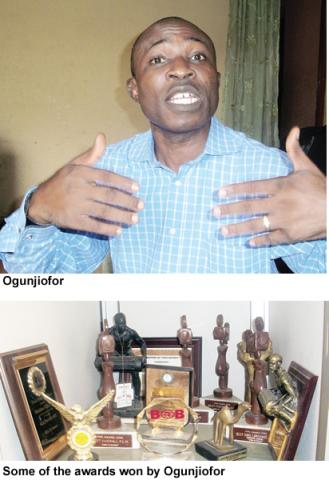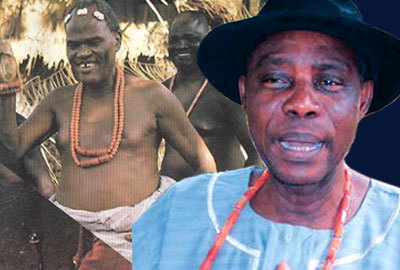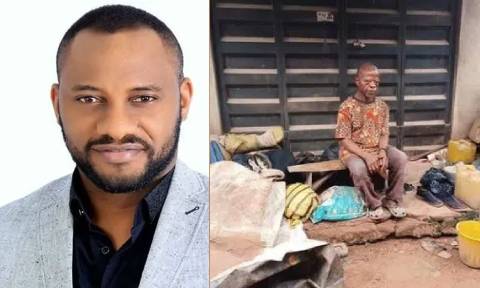
Ogunjiofor and Some of the awards won by Ogunjiofor Okechukwu Ogunjiofor became well known as Paulo for the role he played in one of the very first Nigerian movies to be released on home video, Living in Bondage. Over 18 years after, he has produced soap operas and movies, written books and started an award for those who work behind the movie scenes called TAVA – The Audio-Visual Awards. In this interview with TERH AGBEDEH, he talks about his experience as an actor, producer and a pastor when Friday Flavour went visiting.
After your role as Paulo in Living in Bondage you seemed to stop acting even though you did well in that film as an actor. What happened?
My first passion in life as a Christian is to lay down the roads for others to follow. Trailblazers often lay down the road that people think is impossible so that others can also have a better life. At a point in time, two things happen to a man. There comes a time when you are grappling with your own survival, there also comes a time when you have surpassed that level of thinking about yourself and what to eat which is what children are known for. Beyond that point you begin to ask yourself, how will I better the lot of others? And when that is over you begin to ask yourself, how will I be remembered long after I’m dead?
These are the three phases of a man’s life and so when I did Living in Bondage, I did other productions like Nneka, Circle of Doom, Brotherhood of Darkness and When Flowers turn Black, in all these ones I did my part well. But I noticed that as the days go on, I was training more people. Younger people were coming into the industry either through me or through people that I brought in. So, competing with them on the same platform is odd. Sometimes, I see myself as one of the oldest persons, not age-wise but experience-wise, in this Nollywood.
Secondly, I have, after the production of these movies, become a Christian and I noticed that anywhere I go to preach the gospel, people tend to come out to watch Paulo and not to listen to what the preacher wants to say to them about God. So, beyond the fact that I want to leave the stage for younger people, this is another point. I don’t intend to lose God and people because of my fame so I have decided to down tools in that area. But I have remained behind the scenes creating productions both on television and on film, consulting for people and yet thinking also how to better the industry. Which is one of the reasons I instituted this awards called African Audio Visual Awards, TAVA.
So that the industry beyond me can get even better for the new players. I was not even trained as an actor but as a film producer so I create entertainers and I may not be the entertainer. I chose the one where I think I have comparative advantage over others which is to chart new courses for the industry, to create better opportunities for our teeming masses who are unemployed so that they can get opportunities to play on film. And also to strengthen the structures and redefine the practise to get better to compete globally. That’s my calling, It’s not to be on stage. How many people on stage outside making films have actually advanced that industry?
When you mention Nigeria overseas, what comes to mind is Nollywood. Back then when you, Kenneth Nnebue and other colleagues decided to put Nigerian movies on home video, did
you envisage that it would come this far?
To be candid, if I tell you that I saw the industry this big then I would be a big liar. The truth is that I was actually looking for a means of livelihood. I was just going to make that film in Igbo language to put money in my pocket and create an alternative filmmaking format. I also wanted to reach out to my Igbo community because they don’t go to the cinema but they like to have video players in their homes. We took the theatre to their homes.
That was all I did and I didn’t even see it growing beyond the Igbo enclave to conquering West Africa, Africa and becoming the second largest filmmaking industry in the world. Or even giving jobs to these number of millions of youths in Africa and the Caribbean. The older filmmakers taught us how to make films on reel but the format was going out and a lot of us who learnt filmmaking couldn’t afford the big budget you need for big format. I said to myself, there are VHS cameras everywhere and if one could just shoot a film on that, we can tell the same story told using big format. And cine is all about telling stories so I said let me do an Igbo film that can put money in my pocket, to be employed and give birth to what I learnt in school. Kenneth Nnebue himself was a merchant selling VHS cassettes.
The meeting between us gave rise to what you see today. Kenneth wanted to sell his cassette and make money, I wanted to produce something out of nothing and before you know it Living in Bondage became a super hit that everybody was talking about. It became a cross cultural phenomenon that you can say it’s the only global brand that is indigenous. The only Nigerian global brand is Nollywood.
It appears that brand is not properly being marketed.
It is the African man’s nature of not knowing what he is worth. Africans still feel inferior to their white counterparts because we believe that they are superior otherwise there is nothing different from Nollywood, Bollywood and Hollywood. All of them are telling stories but the government of these other nations have thrown their weight, their financial muscle and created enabling environment for their industry players to work with them.
To redefine and create the environment for the outside world to see them with a new periscope. You watch different films talking about the prowess of America in war and you are afraid to go to war with them. You watch Chinese films and see how they are promoting their religion and karate and our people are buying into yoga. It couldn’t have been possible if it were not done through film because what the eye sees, it retains. But our own government pays lip service to what we do.
It’s the second filmmaking country in the world. It has employed so many youth in Africa but our government has not recognised the fact that this industry is what it needs to create greater employment and even sell its manifestoes government policies and programmes to the people, the world. Today, the average American watch our films and see the type of homes we shoot in, cars we drive and clothes people are wearing. They marvel that these people are not living on trees after all. The government of the day does not understand that film can be used for propaganda, education, massive employment and to sell the programmes and policies of a nation to its people.
Film can also be used as a mind control instrument, psychological warfare across the nations, as a vehicle for cultural integration and to export that culture to other parts of the world. Film is everything because it’s all about sight and sound. But our people tell you that they recognise Nollywood but they are not ready to put money into it.
Forget the fact that there is $200 million as an intervention for artistes to create more jobs. But you know that money is not what we need because this industry has sustained itself for more than 18 years as a private sector driven entity. What we need now is structures and these structures are not just physical structures. for instance, the government gives every filmmaker the opportunity to shoot in army formations or naval base to let people know the strength of our armed forces has. Any filmmaker who does that will get it free not pay through your nose. Or for somebody who wants to shoot in hospitals or police stations, places that are ordinarily regarded as secure.
It would seem that all of that is changing because at President Goodluck Jonathan’s dinner with stakeholders in art and culture, these were some of the issues raised.
That is all talk until all those things are working. Until a filmmaker wants to shoot at these airports and you don’t need one or two year permit and even with that permit you still are not allowed access. Until you write to the police for handcuffs and for guns and personnel come to guide you on how police officers behave. Until you are able to get to government hospitals and agencies and you are given information and the doors are thrown open for you to shoot and pass on the message you want. Until that time comes, it’s still tantamount to mere rhetoric. I have not seen that change yet.
Most of us would have died before now because there was no infrastructure to practise filmmaking. The cinemas decayed and now they are bouncing back gradually but they are still private sector driven. If every local government headquarters has a viewing centre, you would have 747 local cinemas. Those are the structures we are talking about. The mega ones can still be there. But how many of our local dwellers can come to the mega cinemas? That is the first thing a filmmaker needs to do; take it to as many people that will watch your film and pay for it.
You are now involved with TAVA. What is it all about?
We have been churning out movies in the over 18 years of Nollywood. The market has received our movies and the world has acknowledged that we are great filmmakers. But that is at the detriment of the quality. When I set out to do Living in Bondage, I did not feel that the camera I was using was of the topmost quality I still recognised the cine cameras are better because the resolution lines are higher. But since we cannot produce with them on the meagre amount of money in our pockets, the alternative is to use whatever opportunity you have, even if it’s a mobile phone to tell your story; to eke out a living instead of dying. But now that we have stabilised as filmmakers, we need to look beyond quantity to quality. The quality is improving slowly so I said let’s put a reward to filmmaking.
Let’s look at the men behind these great pictures whom nobody has seen, knows or celebrate. We can’t talk about the quality of the film if you are celebrating the artistes alone who are the face of the pictures. Nobody has given the people who create these stars a pat on the back. That’s why I said let’s create an opportunity for them to submit their works every year. We are not judging any other thing but quality of sound and picture, which encompasses light, camera movement, equipment used, editing, effects, music and even the costume. These are the things that make a film what it is outside the story and the faces used. By the time you do this award annually people will either go back to re-train or they would no consciously hire those who know how to create pictures that will win awards.
TAVA is the African Audio-Visual Awards for every African who makes films all over the world. So its target is Africans at home and in the Diaspora. The awards are trying to bring synergy to our brothers in the Caribbean, in the Americas who make films bit are black to come here once in a while and network with local audiences and practitioners. This meeting point will eventually throw up technology transfer and our people will learn how to patiently do things right. For instance, if a black filmmaker from Hollywood is here to shoot with anwy of our producers things will be done if not 100 percent 80 percent the way it is done in America.
Here we have workforce and market but there are principles of production that most of us are throwing overboard for quantity. But when these people join us what you find out is that consciously, they will insist on this quality and our people will bring in their creative prowess and speed producing a good film. Look at what they did with Slumdog Millionaire done in India but going ahead to win many international awards. We need to bring these filmmakers under one roof to talk about how to move the industry forward. TAVA seeks to recognise the team work in creating pictures by looking at the men behind the scenes in the industry.
You are accepting entries for the third edition of the awards which will close on May 31. How has the response been here in Africa and in the Diaspora?
Wonderful. Globally people have reckoned with what we are doing because the first film that won was a South African movie. What we have not had yet is Diaspora participation in terms of coming in with their entries because they are still watching us. We are in constant talks, but so far in Ghana, South Africa, Mozambique, Kenya, Egypt, all over Africa the reception is huge and our judges are spread across Africa.
You studied film production at the TV College in Jos. While you were studying that were you also exposed to electives in acting?
Yes, we did acting but it was just a small thing. We also did art appreciation, we studied every aspect of production including make-up, design. These days a producer does not know what a set designer is doing but if you have studied film production you will not be new to all these aspects of film and when you hire somebody it will be from the position of knowledge. A producer should be able to know something about every facet of production.
That is where training comes in. But people seem to run away from training in Nollywood.
That’s why TAVA is here because it will push you to training and retraining because when you are not getting accolades for quality people would not want to patronise you and if you lose jobs you will either find yourself back to school or learn under those who have the knowledge.
Your schedule looks very busy, how do you relax?
I don’t really go out of my way to relax. I’m what you can call a home man; I go to church, the office and home. When you spend one minute in the presence of God, I don’t know what other kind of relaxation you are looking for because in the presence of God everything is complete. Your life turns completely new because God is new every morning. That is the way I relax. I don’t indulge in anything; I don’t drink, I don’t smoke. And if you are a creative person that is enough adrenaline in your blood because creativity keeps you completely above board.
Life is all about discipline and there is nothing that you can achieve in life without discipline. If God has given you the grace to be alive and more grace to know Him the only way to sustain these things, even the principles you believe in or even the practise you are in to excel, you need discipline. And that is one of the banes of Nollywood and Nigeria, indiscipline, which breeds a lot of vices. You want to cut corners, assume roles that are not yours, unduly compete with others when it is not necessary. Discipline makes you focused and helps you control your appetite for food, sex or drink. Anything that any man does with indiscipline he does in excess. If you do anything in excess, you are dead.
What happened to your productions on television like Rough Edges and Syberia?
Syberia is still on DSTV but I have rested it. I have another one called Hope Avenue, which is on about 12 television stations now. So, we are still there.
You also did some writing.
I have four books and a series of magazines for youth, a drama magazine called Happy Days. Mine has always been to create new opportunities. That was another avenue to look at those who couldn’t play on television and film, so that they can play on the pages of magazines as actors and realise their dreams. But the patronage was low and it’s a publication that will be back anytime we have the required funds.



















